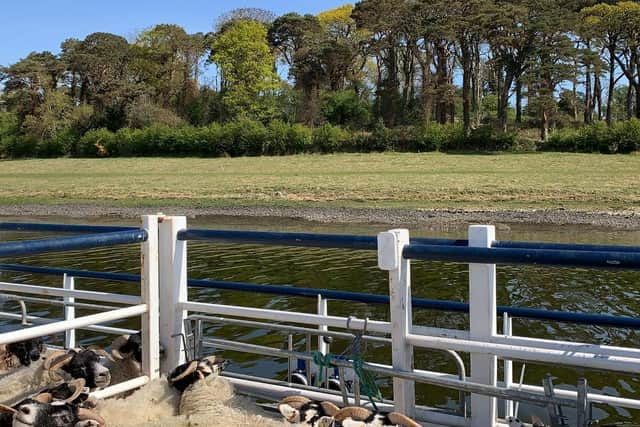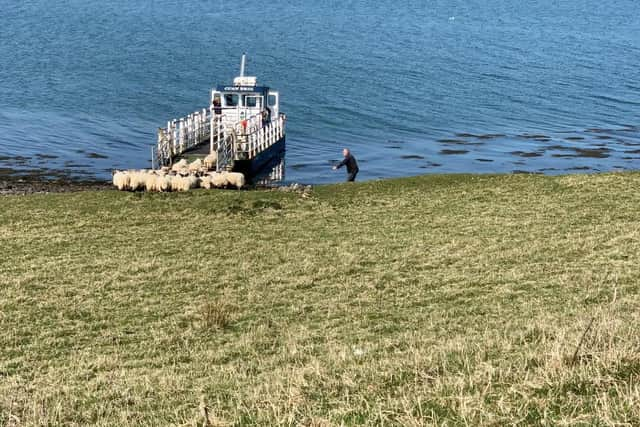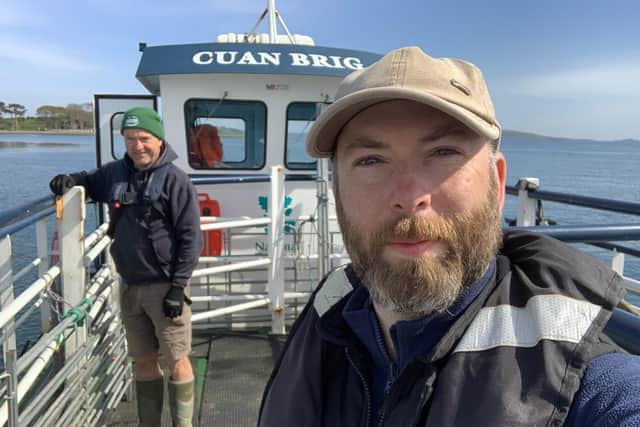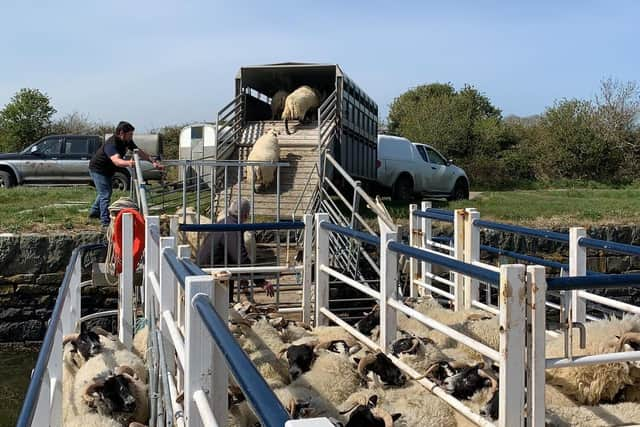Sheep cross Strangford Lough on barge, continuing a tradition of island farming
and live on Freeview channel 276
From animals swimming short distances, to transporting them on makeshift rafts, cows and sheep have long benefited from the varied pasture.
The grazing plays an important role in the conservation management of the land, helping to control the growth of scrub and providing excellent habitat for local wildfowl and migrating birds to thrive.
Advertisement
Advertisement
As a charity, the National Trust is responsible for the care of 20 islands on Strangford Lough – 12 of which are grazed for most, or some, of the year.
Last week, rangers from the National Trust Strangford team assisted local tenant farmers Frankie and Kevin McCullough to remove 150 grazing hoggets (young sheep) from Salt Island, for transport to the slopes of Slieve Croob, Co Down.
The National Trust has been operating a livestock barge, or cot, on the lough since 2000 – firstly, the Penelope (until 2012), and then the Cuan Brig (from 2014).
The vessel has allowed for the continued farming of the islands of the lough.
Advertisement
Advertisement
Without it, there would have been land abandonment and the afforestation of the islands, either through planned planting or natural succession.


This would lead to a radical change to the green drumlin landscape of the lough, which is unique in Northern Ireland.
Head ranger Hugh Thurgate said: “Loss of grazing and subsequent scrub development would see a very significant loss of species-rich grassland, a rapidly shrinking plant community in Co Down.
“It would also lead to a decline in suitable grazing habitat for wintering wildfowl and a loss of suitable habitat for breeding seabirds for which the lough is internationally renowned.
Advertisement
Advertisement
“Woodland development would also lead to the disappearance of visible culture, history and archaeology which is currently wonderfully accessible.


“There are other commercial barges operating on the lough but none of them are designed for the transportation of livestock.
“The Cuan Brig is the only vessel that farming landowners and tenants can hire for the movement of stock and is available to anybody, it’s not just for National Trust tenants.”
Rangers Hugh and Will Hawkins took the helm of the Cuan Brig to move two boatloads of hoggets off Salt Island.
Advertisement
Advertisement
These animals were offloaded at Mullagh Quay before being taken to Frankie’s farm on the slopes of Slieve Croob.


The hoggets will spend their summer on the mountain before being assimilated into Frankie’s flock of 450 breeding Scottish blackface ewes.
The Mullagh Quay is one of a series of early stone-built quays on the Lough that pre-date the 1834 Ordnance Survey Map.
In its day, amongst other things, it is likely to have seen the importation of coal and export of grain and potatoes.
Advertisement
Advertisement
Hugh said: “It is one of the pleasures of using the barge that we can re-use quays that have been around for close to 200 years, for the first time in many, many decades.
“Frankie, while being a man of the mountains, born and bred, also has a strong connection to the Co Down coast, grazing sheep on Copeland Island for 20 years and on Salt and Green Islands on Strangford Lough since the early 1980s.
“These islands provide relatively high-quality seasonal pasturage for mountain sheep and have become integral to Frankie’s whole farming enterprise.”


Island farming is just one example of the National Trust’s ambition to use methods of conservation farming to ensure the local environment and wildlife are allowed to flourish, while also working in harmony with farmers.
Advertisement
Advertisement
Do you have a story that you would like to share with Farming Life? If so, email [email protected] or mobile 07803 506235.
A message from the Editor:
Thank you for reading this story on our website. While I have your attention, I also have an important request to make of you.
In order for us to continue to provide high quality and trusted local news on this free-to-read site, I am asking you to also please purchase a copy of our newspaper whenever you are able to do so.
Our journalists are highly trained and our content is independently regulated by IPSO to some of the most rigorous standards in the world. But being your eyes and ears comes at a price. So we need your support more than ever to buy our newspapers during this crisis.
Advertisement
Advertisement
With the coronavirus lockdown having a major impact on many of our local valued advertisers - and consequently the advertising that we receive - we are more reliant than ever on you helping us to provide you with news and information by buying a copy of our newspaper when you can safely.
You can also enjoy unlimited access to the best news from across Northern Ireland and the UK by subscribing to newsletter.co.uk.
With a digital subscription, you can read more than five articles, see fewer ads, enjoy faster load times, and get access to exclusive newsletters and content. Visit https://www.newsletter.co.uk/subscriptions now to sign up.